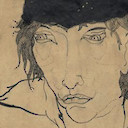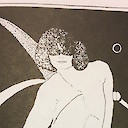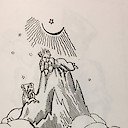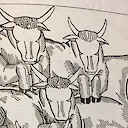Crystals
a dead princess poem
Wax heavy, snared in age-splintered linen, the king’s daughter;
The shimmer of her eyeballs blue beneath the lids like thin rain water.
Small and sour lemon blossoms banked at the breast-bone;
Her two small breasts dark of death and stained a dark tone.
Her lips flower-tarnished, her cheek-braids bulked in rust.
Her shoulders as hard as a wall-tree, frosted with dust.
Precise bone, clipped and grooved, and as sure as metal.
Leaf of flesh built high, like china roses, petal on petal.
Odor of apples rising from the death robes chinks and breaks.
Seeds of pepper falling down from brittle, spiced tomb-cakes.
Her swift cunning impaled on her brain’s darkness. She died
Of her heart’s sharp crystal spiral pricked in her side.
Six tomb Gods in basalt make her one of these—
Who lie a million years, listening to thieves.
"Crystals" is a dead princess poem. Think of Parsifal; Maeterlink's Pelleas et Melisande, about a sick and dying princess, treated by Debussy, Schoenberg and Sibelius; Ravel's Pavane pour une infante défunte, etc. Barnes came to Decadence and Aestheticism very honestly through her grandmother. Barnes' grandmother Zadel knew Oscar Wilde and moreso Wilde's mother. Djuna was called "the American Aubrey Beardsley".
One might think of "Crystals" as a different view of the same spirit that is very much in action in the previous song, "She Passed This Way". Daemonic forces have lifespans. In "She Passed This Way" we are in the moment, but also looking forward. In "Crystals" we are looking back at a powerful daemonic force. The power is not diminished for having passed, and Barnes, with extraordinary precision, gets the changes of color.
See also,
- Arnold Schoenberg's Book of the Hanging Gardens (Stephan Georg)
- Busoni's Berceuse Elegiac
- Webern's Op. 14, settings of Georg Trakl
- Benjamin Britten's Songs of the Chinese
This extraordinary bit from Barnes' novel, Nightwood, reminds us of Trakl:
“The perfume that her body exhaled was of the quality of that earth-flesh, fungi, which smells of captured dampness and yet is so dry, overcast with the odour of oil of amber, which is an inner malady of the sea, making her seem as if she had invaded a sleep incautious and entire. Her flesh was the texture of plant life, and beneath it one sensed a frame, broad, porous and sleep-worn, as if sleep were a decay fishing her beneath the visible surface. About her head there was an effulgence as of phosphorous glowing about the circumference of a body of water - as if her life lay through her in ungainly luminous deteriorations - the troubling structure of the born somnambule.”
Crystals is in the vien of "To the Dead Favorite of Liu Ch'e", a poem by Barnes that mirrors and exceeds in many ways a similar poem by Ezra Pound. "To the Dead Favorite of Liu Ch'e" was published in The Dial, along with Pastoral (song # 6).
Pound's "Liu Ch'e" is echt imagism:
The rustling of the silk is discontinued,
Dust drifts over the court-yard,
There is no sound of foot-fall, and the leaves
Scurry into heaps and lie still,
And she the rejoicer of the heart is beneath them:
A wet leaf that clings to the threshold.
Imagism: see The Complete Works of T.E. Hulme. T.S. Eliot spoke of "the objective correlative". The impulse is throughly antiromantic. The travails of an individual are of no interest. Personal expression is of no interest. Stravisnky: "My music does not *express* anything".
Djuna Barnes riffs on imagism, but tended to usurp it. She would show she can do it, then shift gears. Harold Bloom would call that a poetic crossing from the shared space of the objective correlative back to the personal, or taken to its extreme, back to a solipsistic state.
Barnes was not one to jump on bandwagons.
This is likely a response to Pound:
"To the Dead Favourite of Liu Ch’e"
THE SOUND of rustling silk is stilled,
With solemn dust the court is filled,
No footfalls echo on the floor;
A thousand leaves stop up her door,
Her little golden drink is spilled.
Her painted fan no more shall rise
Before her black barbaric eyes—
The scattered tea goes with the leaves.
And simply crossed her yellow sleeves;
And every day a sunset dies.
Her birds no longer coo and call,
The cherry blossoms fade and fall,
Nor ever does her shadow stir,
But stares forever back at her,
And through her runs no sound at all.
And bending low, my falling tears
Drop fast against her little ears,
And yet no sound comes back, and I
Who used to play her tenderly
Have touched her not a thousand years.
–The Dial
Barnes' Liu Ch’e is impure, compared to Pound's?
We see the stamp of Djuna's wit. It is a riot, really?
It has too much fun for its own good?






